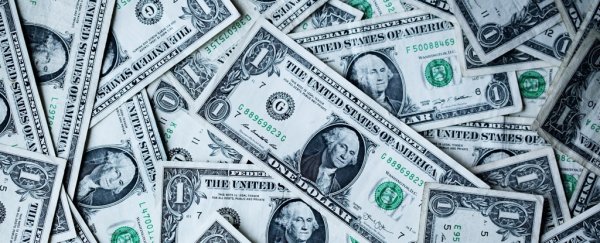Do you want $500? No, seriously, you can have it right now. Or, if you can hold off for a little while… you can actually have $1,000. So, what's it going to be?
As it turns out, the way you decide to answer this hypothetical question may in fact be a predictor of your earning potential – not just to earn the $500 (or $1,000), but your actual earning potential and level of affluence.
In new research that builds upon the classic marshmallow test – a psychological experiment designed to measure how successfully children can delay gratification for greater future rewards – researchers updated the trial, with a machine learning twist.
This ability to hold off for future rewards is known as delay discounting, as many of us inevitably decide to 'discount' the value of future rewards to immediately gratify ourselves, even though accepting a lesser reward isn't exactly rational.
And the team behind this latest study wanted to see whether bringing yourself to be rational in these kinds of tempting circumstances could tell us anything about people's earnings.
"All sorts of things predict income. We knew that this behavioural variable, delay discounting, was also predictive – but we were really curious how it would stack up against more common-sense predictors like education and age," explains neuroscientist William Hampton, now at the University of St. Gallen in Switzerland, who conducted the study while at Temple University in Philadelphia.
"Using machine learning, our study was the first to create a validated rank ordering of age, occupation, education, geographic location, gender, race, ethnicity, height, age and delay discounting in income prediction."
Hampton and fellow researchers studied the responses of over 2,500 people in an online experiment, where participants were asked whether they would hypothetically accept a smaller sum of money (US$500) or a larger sum ($1,000) after a delay, which could be one day, one week, one month, 6 months, or one year.
Participants were also asked to fill out a questionnaire in which they reported their annual income, level of education, age, sex, height, zip code, occupation, race, and ethnicity.
When the researchers used machine learning algorithms to model the relationship between individuals' tendency for delay discounting and the other self-reported variables, they found that delay discounting was more predictive of income than age, ethnicity, race, and height.
"People already know that your job and education are important, but it's likely that few people would guess that your ability to delay gratification is also very important," Hampton explained to Morressier.
"This research may spur a greater interest in how we could train people, especially children, to be better at delaying gratification."
Of course, for decades the marshmallow test has been suggestive of the kinds of personal benefits attached to our ability to deny instant gratification – although other studies have suggested the original experiment's findings were flawed.
The new study gives us another way of looking at this area of research, although Hampton points out there are limitations to be aware of – such as the fact that only American participants were studied – that limit how much insight we can glean from the results.
And even the causal direction here is unknown, for now.
"Our study was cross-sectional, so we can't say whether lower delay discounting leads to higher income or whether higher income leads to lower discounting," Hampton explains.
Still, while researchers conduct further experiments to tease out more answers, Hampton says it couldn't hurt to instil a restraint ethos wherever possible in the next generation – as you might be doing them a big favour.
The findings are reported in Frontiers in Psychology.
